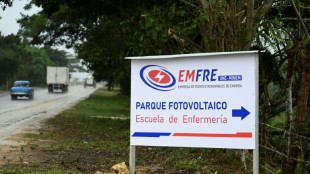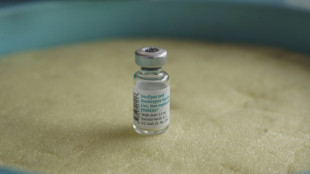
-
 Bibas family says mother's remains home, ahead of Gaza hostage-prisoner swap
Bibas family says mother's remains home, ahead of Gaza hostage-prisoner swap
-
New Zealand says Chinese naval vessel fires live rounds in new drill

-
 Cavs crush Knicks in battle of NBA East elite, Thunder roll
Cavs crush Knicks in battle of NBA East elite, Thunder roll
-
Ukraine's earth riches are rare and difficult to reach

-
 Cook Islands strikes deal with China on seabed minerals
Cook Islands strikes deal with China on seabed minerals
-
Highlights from Berlin as film festival wraps up

-
 Disinformation blizzard targets Germany before election
Disinformation blizzard targets Germany before election
-
Bibas mother confirmed dead as Gaza hostage-prisoner swap set to go ahead

-
 Cavs crush Knicks in battle of NBA East elite
Cavs crush Knicks in battle of NBA East elite
-
The last carriage horses of Indonesia's capital endure harsh lives

-
 Gaza hostage-prisoner swap set to go ahead after row over bodies
Gaza hostage-prisoner swap set to go ahead after row over bodies
-
Australia says China has not explained naval live-fire warning

-
 On $15 a month, Venezuela's teachers live hand to mouth
On $15 a month, Venezuela's teachers live hand to mouth
-
Reds boss Kiss hails resilience in 13-try Super Rugby extravaganza

-
 Porn stars: Oscar favorite 'Anora' gets sex work right
Porn stars: Oscar favorite 'Anora' gets sex work right
-
Arab leaders meet in Saudi Arabia to hash out Gaza plan

-
 South Africa's Potgieter fires 61 to grab PGA Mexico Open lead
South Africa's Potgieter fires 61 to grab PGA Mexico Open lead
-
LA prosecutor says opposes new trial for Menendez brothers

-
 Australia says no live firing seen or heard from Chinese ships
Australia says no live firing seen or heard from Chinese ships
-
US proposes Ukraine UN text omitting mention of occupied territory: diplomats

-
 Trump says Zelensky and Putin must 'get together'
Trump says Zelensky and Putin must 'get together'
-
AP sues White House officials over denial of access

-
 Everton boss Moyes doing a better job than me, says Man Utd's Amorim
Everton boss Moyes doing a better job than me, says Man Utd's Amorim
-
'See you in court': Trump, governor spar over trans rights

-
 US stocks tumble on fears of slowdown
US stocks tumble on fears of slowdown
-
Champions Spain fight back in Women's Nations League opener, England held

-
 M23 pushes deeper in east DRC, UN urges Rwanda forces to leave
M23 pushes deeper in east DRC, UN urges Rwanda forces to leave
-
Leicester hit historic low in Brentford rout

-
 LA mayor sacks fire chief over handling of deadly blazes
LA mayor sacks fire chief over handling of deadly blazes
-
Suspect arrested after stabbing at Berlin's Holocaust memorial

-
 Cuba opens solar park hoping to stave off blackouts
Cuba opens solar park hoping to stave off blackouts
-
'Super tough' Rublev in third Qatar final, faces Draper for title

-
 Yankees change facial hair policy to allow 'well-groomed beards'
Yankees change facial hair policy to allow 'well-groomed beards'
-
'History will not forgive' failure to seal pandemic deal: WHO chief

-
 There's optimism Wembanyama will make strong recovery
There's optimism Wembanyama will make strong recovery
-
Cognac on the rocks: industry seeks French govt help from Chinese tariffs

-
 Texas measles outbreak reaches 90, mostly unvaccinated
Texas measles outbreak reaches 90, mostly unvaccinated
-
Holders Spain stun Belgium with late comeback in women's Nations League

-
 Man badly wounded in suspected stabbing at Berlin's Holocaust memorial
Man badly wounded in suspected stabbing at Berlin's Holocaust memorial
-
Ex-Trump aide's 'Nazi ideology' salute sparks French party leader's protest

-
 Man found guilty of trying to kill Salman Rushdie
Man found guilty of trying to kill Salman Rushdie
-
Man badly wounded in assault at Berlin's Holocaust memorial: police

-
 USA needs travel reforms to cope with mega sports events: report
USA needs travel reforms to cope with mega sports events: report
-
World champion Brignone storms to Sestriere giant slalom

-
 'Unknown little Englishman' Sherratt hoping to reverse Welsh fortunes
'Unknown little Englishman' Sherratt hoping to reverse Welsh fortunes
-
Pope not out of danger, doctors say, amid questions over future

-
 Christie's first-ever AI sale angers some artists
Christie's first-ever AI sale angers some artists
-
M23 advances deeper in east DRC as Congolese troops flee

-
 German flying taxi start-up's rescue deal collapses
German flying taxi start-up's rescue deal collapses
-
Court of Arbitration for Sport rejects Rubiales ban appeal


Tech, auto, medicines: who will pay Donald Trump's tariffs?
After steel and aluminium, US President Donald Trump has set his sights on slapping 25 percent tariffs on semiconductors, cars and pharmaceuticals.
Trump has already slapped additional 10 percent tariffs on goods from China and has also threatened tariffs on Canada and Mexico, plus ordered a study into putting into place reciprocal tariffs.
Here's a look who would be hit the hardest if US import tariffs on semiconductors, cars and pharmaceuticals go into force.
- Semiconductors: Asia in the crosshairs
Semiconductors, or microchips, are the brains in our electronic devices and demand has soared with the development of AI, which relies on thousands of them to crank through reams of information.
Asia is a major centre of manufacturing of semiconductors.
The United States exported $70 billion of electronic components last year, but imported double that amount, according to the US Commerce Department.
Imports from Taiwan alone represented nearly $37 billion.
The island is home to chip manufacturing giant TSMC and a big portion of its factories. Tariffs could encourage it to diversify its production sites further. It already has plans to build three new factories in the United States.
Taiwanese President Lai Ching-te said last week that Taiwan would "expand investment and procurement in the United States to promote bilateral trade balance".
South Korea, home to Samsung, saw its exports of electronic components double last year to more than $8 billion, according the country's customs data. Its components are the country's second-largest export item to the United States behind cars.
"Disrupting the supply chain... would create serious challenges for the whole world, including the United States," said an executive of the trade association for South Korea's electronics industry.
- Everyone impacted by car tariffs -
The United States, the world's number two auto market behind China -- imported $269 billion in vehicles last year according to US Commerce Department figures.
Of those, $95 billion came from Mexico. Japan, South Korea, Canada and Germany are also major importers of vehicles into the United States.
US auto exports totalled only $72 billion.
Additional tariffs would affect all carmakers, with US automakers having factories in Mexico and Canada. US carmakers would also be affected through components suppliers located abroad, noted Matthieu Noel at the Roland Berger consultancy.
Laurel Broten, who heads up Canada's agency that attracts foreign investment, Invest in Canada, gave an example of an auto component that crossed the US-Canadian border eight times before being installed into a vehicle.
"Tariffs on 'Canadian cars' are also tariffs on US players in the supply chain," she told AFP.
Moreover, carmakers from all countries, including the United States, built factories "in Mexico to tap into lower wages", noted Noel.
For US consumers, "the price of vehicles will rise considerably. When one adds 25 percent import tariffs that can't be totally absorbed by margins," he said.
But many international brand cars are now made in the United States.
The world's largest carmaker, Japan's Toyota, sold 2.3 million vehicles in the United States last year. But more than half were manufactured in the United States, where it will soon open its eleventh factory.
German carmakers Volkswagen, BMW and Mercedes already manufacture SUVs in the United States.
Stellantis, which owns the Jeep, Ram, Dodge and Chrysler brands in addition to a number of European marques -- said it wants to boost its US production even before Trump's latest announcements.
- Pharmaceuticals: limited impact? -
Ireland alone accounted for 30 percent of US pharmaceutical imports in 2024. The country's favourable tax rates have attracted drugs manufacturers, including US firms.
Italy was the top source for US antibiotics imports, followed closely by China.
Nearly a quarter of Germany's pharmaceutical exports -- in particular vaccines and immunology products, head to the United States.
Some products are in very high demand by Americans, particularly the weight-loss treatments Ozempic and Wegovy made by Danish drugmaker Novo Nordisk.
But the drugs market is not like others, noted analysts at Moody's.
"Patients' medical needs, lack of substitutes, insurance coverage and doctor preferences limit the effects of price changes on demand," it said in a recent note.
"Most branded pharmaceutical companies have diversified manufacturing, including US facilities, and can absorb tariff increases thanks to high profit margins," it added.
US consumers might see more price increases on generic drugs made abroad as manufacturers have tight margins and would likely pass on the cost of tariffs.
C.Meier--BTB
